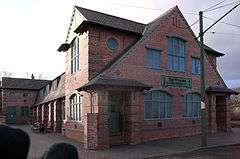Cradley Heath Workers' Institute
| Cradley Heath Workers' Institute | |
|---|---|
 | |
| General information | |
| Status | Preserved |
| Type | Workers' Institute |
| Location | Black Country Living Museum |
| Town or city | Tipton |
| Country | England |
| Coordinates | 52°31′21″N 2°04′39″W / 52.52248°N 2.07750°WCoordinates: 52°31′21″N 2°04′39″W / 52.52248°N 2.07750°W |
| Groundbreaking | 1911 |
| Completed | 1912 |
| Design and construction | |
| Architect | A T Butler |
The Cradley Heath Workers' Institute was built between 1911 and 1912 in Lomey Town, Cradley Heath, West Midlands, England.[1] It was built as a social centre for the Black Country, intended to become a venue for educational meetings and lectures. It also housed Union offices, where members could come to seek guidance, and from which the Contributory Unemployment Fund would be distributed.[2] In 2006 the building was threatened by a bypass and so was moved to the Black Country Living Museum.
Design and construction
The Institute's architect was local man A T Butler.[3] With its projected gables, leaded windows, exposed brickwork and signage in green tiles, the building is a demonstration of Arts and Crafts style.[4]
History
Construction of the Institute was funded using money left over from the strike fund of the 1910 women chainmakers' strike, led by Mary Macarthur. [5]
Between 1915 and 1933 it largely functioned as a cinema.[1] It was then used as a billiards hall until 1950, after which it became postal sorting office until 1995.[1] It was moved to the Black Country Living Museum in 2006 after a bypass threatened the site.[1] It now contains period offices, which are demonstrated by Museum staff, and an exhibition about Mary Macarthur. The original auditorium houses a café for the museum and the stage is used for special events.[6]
References
- 1 2 3 4 Women Chain Makers: Be anvil or hammer. 2009. pp. 19–21. ISBN 978-0-9562031-1-3.
- ↑ Tuckwell, Gertrude; Macarthur, Mary; Shackleton, W. J. (April 1911). Letter from the Executive Committee of the Women's Trade Union League (letter).
- ↑ BCLM – Workers' Institute
- ↑ Black Country Living Museum. Women Chainmakers: be anvil or hammer (PDF). Black Country Living Museum. p. 20.
- ↑ BBC – The 'Stute' to be rebuilt
- ↑ BCLM
